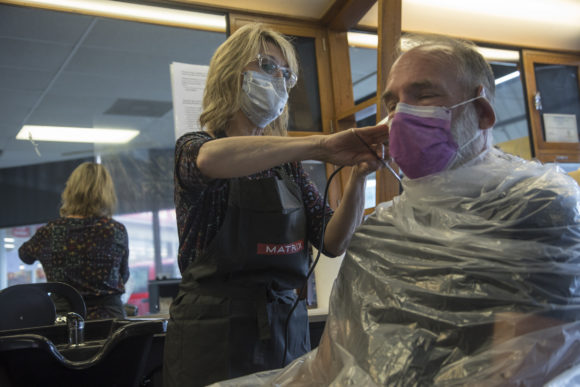NASHVILLE, Tenn. — The names and addresses of Tennesseans who have tested positive for COVID-19 are being provided to first responders, law enforcement and paramedics under a state agreement deemed necessary to help prevent the spread of the coronavirus.
The agreement was finalized on April 3 between Tennessee’s Department of Health and the state’s Emergency Communications Board, according to documents obtained by The Associated Press.
“Health is disclosing to TECB a list of names and addresses of individuals documented as having tested positive, or received treatment, for COVID-19,” the agreement states. “Health intends to update this list daily; after 30 days on the list, an individual’s name and address will roll off of this list.
“Health may cease disclosure of the list upon the termination of the statewide state of emergency for COVID-19,” the document continues.
The agreement — known as a memorandum of understanding — was not publicized when it was signed, but instead distributed to local leaders across the state. Tennessee Lookout first reported on the agreement Friday.
The AP has obtained a copy of the agreement as well as an email from Gov. Bill Lee’s office alerting the Tennessee Association of Chiefs of Police, Tennessee’s Sheriffs Association, and city and county mayors of the news.
“We know that first responder access to information regarding COVID-19 cases is of utmost concern,” wrote Brandon Gibson, Lee’s senior advisor, on April 3.
The email was sent just hours before a deadly tornado ripped through southeast Tennessee, which killed four people, injured dozens and destroyed more than 100 buildings on Easter Sunday.
The tornado forced emergency staffers to respond to a natural disaster in the middle of the COVID-19 pandemic.
A few days later, separate emails show Robertson County Sheriff Mike Van Dyke seeking help from the governor’s office to receive the list of names and addresses after initially being denied.
Van Dyke said his county’s 911 dispatchers needed the data to “so that our first responders continue to have the same safe guards in place for all areas that they are required to respond for calls of service.”
Gibson responded that she would look into the matter and the department has since received the information.
Lee told reporters Friday that the U.S. Department of Health and Human Services provided guidance allowing states to enter into such MOUs.
“We know that first responders are required to, and law enforcement required to, come in contact with these people as part of their job, and that’s why Health and Human Services gave that guidance to states, and that’s why we’re implementing that,” the Republican said.
As of Friday, nearly 70 police chiefs and sheriffs have received the names and addresses of COVID-19 patients.
The choice drew criticism from the American Civil Liberties Union of Tennessee, which said first responders should take precautions when entering any home because many people haven’t been tested and they can carry the virus without symptoms.
“Disclosing the personal information of individuals who will never have contact with law enforcement raises fundamental concerns about privacy without yielding a significant public health benefit,” ACLU of Tennessee Executive Director Hedy Weinberg said in a statement.
Meanwhile, the Tennessee Department of Correction has confirmed that a second state inmate who had COVID-19 has died.
Department spokeswoman Dorinda Carter said the Bledsoe County Correctional Complex inmate was a 78-year-old man with underlying medical conditions. The cause of death is pending the medical examiner’s determination.
State corrections officials have said 580 out of 586 inmates who tested positive for COVID-19 at the Bledsoe prison have finished 14 days of isolation without showing symptoms.
The largest state prison outbreak has been at Trousdale Turner Correctional Center, which is privately run by CoreCivic. About 1,300 inmates — about half of the prison’s population — and 50 workers tested positive there, including Tennessee’s first state inmate to die after contracting COVID-19.
Tennessee officials have ordered up testing for all the inmates and staff in the state prison system. As of Thursday, 55 staffers had tested positive statewide at the facilities run by the department, not CoreCivic, with 25 of them already back at work, Carter said.
Also Friday, the U.S. Department of Health and Human Services said it is distributing more than $35 million to two Tennessee hospitals affected by the virus outbreak. Vanderbilt University Medical Center is receiving more than $24.7 million and Sumner Regional Medical Center is getting more than $10.6 million, according to department data.
There were more than 14,400 cases of COVID-19 confirmed by the state as of Friday, including at least 241 deaths.
For most people, the new coronavirus causes mild or moderate symptoms that clear up within weeks. For some, especially older adults and those with existing health problems, it can cause more severe illness and be life-threatening.
About the photo: Town and Country Barber Shop and Salon owner Marti Brown cuts her husband Ron’s hair inside of their shop, Tuesday, May 5, 2020 in Chattanooga, Tenn. Barber shops and salons across Tennessee will be reopening Wednesday, with strict regulations in order to maintain social distancing practices put in place to stop the spread of coronavirus. (Troy Stolt/Chattanooga Times Free Press via AP)
Was this article valuable?
Here are more articles you may enjoy.


 Hackers Hit Sensitive Targets in 37 Nations in Spying Plot
Hackers Hit Sensitive Targets in 37 Nations in Spying Plot  Portugal Rolls Out $2.9 Billion Aid as Deadly Flooding Spreads
Portugal Rolls Out $2.9 Billion Aid as Deadly Flooding Spreads  LA County Told to Pause $4B in Abuse Payouts as DA Probes Fraud Claims
LA County Told to Pause $4B in Abuse Payouts as DA Probes Fraud Claims  Berkshire Utility Presses Wildfire Appeal With Billions at Stake
Berkshire Utility Presses Wildfire Appeal With Billions at Stake 